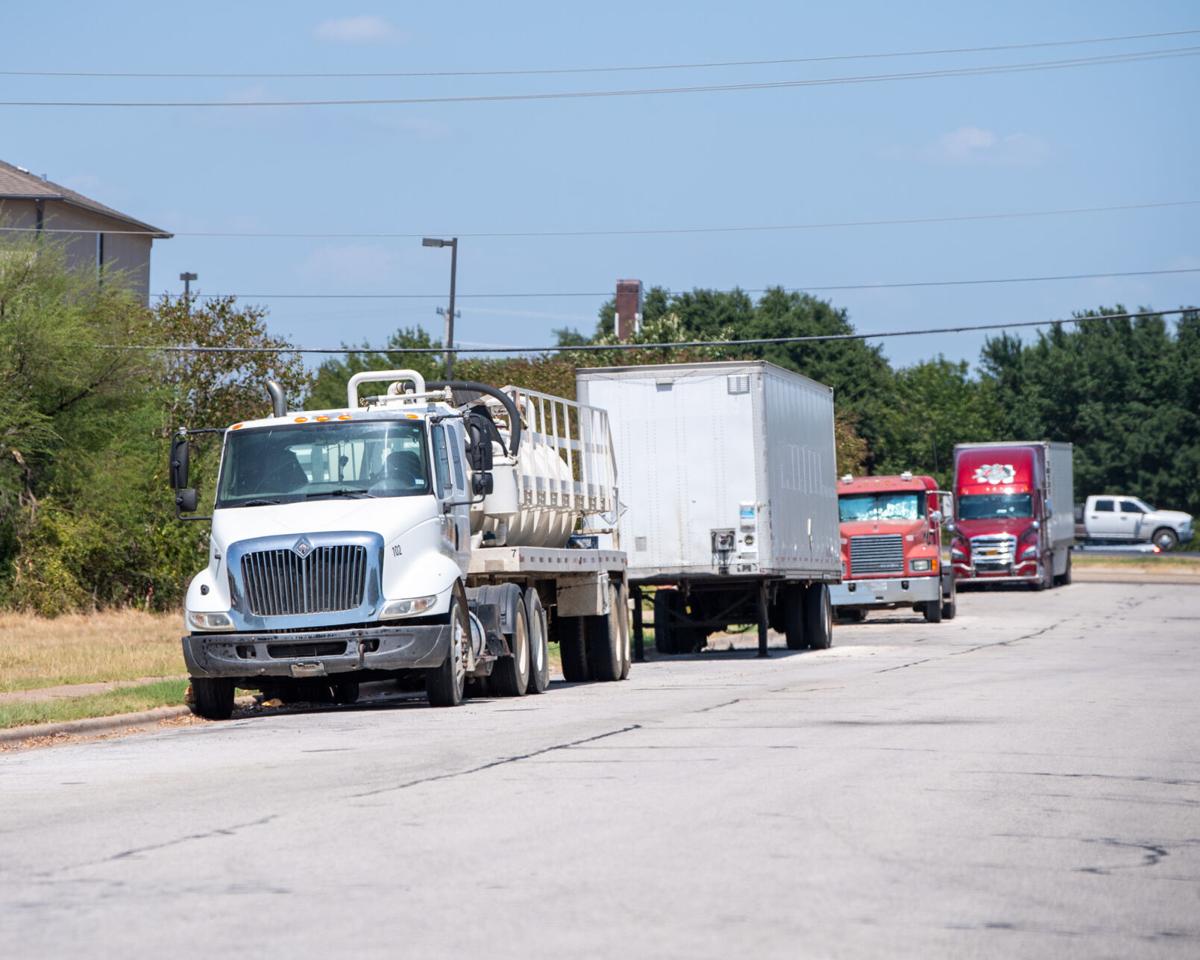Trucker opposes proposed College Station ordinance to restrict truck parking citywide
Published: Wed, 11/22/23
Trucker opposes proposed College Station ordinance to restrict truck parking citywide

Trucks and trailers are parked on Ponderosa Drive in College Station in August. A proposal to ban trucks and trailers from parking overnight in College Station has sparked debate.
Meridith Seaver
That’s the case made by Lewie Pugh, a truck driver for 25 years whose driven over 2.5 million miles. Pugh, who now works as executive vice president of the Owner-Operator Independent Drivers Association, said there are not enough resources currently available to support truck drivers who provide essential services to the community and he’s concerned by a potential College Station ordinance that would further restrict truck parking in the city.
“There’s only one safe space for every 11 trucks in this country right now,” he said. “Nobody wants trucks … and we get this NIMBY effect where people don’t want trucks in their backyards. You can’t get toilet paper or food or stuff from Amazon without trucks.”
The College Station City Council recently asked staff to create an ordinance that would ban truck parking on streets citywide. According to staff, they had received complaints that large trailers and trucks parked on streets cause serious safety concerns such as the ability for emergency vehicles to safely get to neighborhoods.
Bryan does not allow commercial truck parking anywhere in the city limits, according to city staff. Bryan has four designated truck stops while College Station has one.
The Federal Motor Carrier Service Administration requires that truckers are on the road for a maximum of 11 hours per day and may not drive after 60 to 70 hours in a week. Truckers also typically get paid per mile they drive, according to the U.S. Bureau of Labor Statistics.
Due to these restrictions, Pugh said once the maximum hours are done, truckers are forced to find a place to stop and rest, no matter their mileage.
“They’re only allowed to work a total of 14 hours in a day. They then have to take a 10-hour break every day,” he said. “Sometimes you may go in and have four or five hours left to drive but it takes us longer to unload and we run out of hours.”
Pugh spoke at Congressional meetings about the Truck Parking Safety Improvement Act, which would authorize funds to provide grants that governments could use to build or improve public parking facilities.
“It would put out $755 million in designated funds for parking, and a local community or state government can get that to increase parking for trucks,” he said.
Pugh said he is passionate about getting more resources available for truck drivers because, as a trucker, there were times he was left to make difficult decisions while traveling.
“I had run out of hours, I was tired and it was late at night. I pulled into a service plaza in Massachusetts Turnpike and I parked on the car side,” he said. “About 3 in the morning, I was woken up by Massachusetts [law] enforcement.”
Pugh said there were other parked trucks that also were forced to move from the service plaza while being out of hours, which could have caused them to get ticketed as well.
“They gave me a $100 parking ticket and told me to go down the road to get out of there, but I didn’t have hours to operate, so what was I supposed to do?” he said. “I could have been stopped by another enforcement officer and given a violation for operating my vehicle out of hours.”
Hours are tracked in each truck through an electronic logging device [ELD], that cannot be tampered with, Pugh said.
“What [ELDs] do is they track the truck and are hooked up to your motor,” he said. “Anytime that truck moves, it knows it. … If you get stopped anywhere later on, they can see you had a log violation and you can receive a ticket.”
Pugh said truck drivers don’t need a lot of external resources for parking and would be fine with a bathroom and lights for safety.
“Truck stops are great because they provide food and showers, but they, unfortunately, are not able to build or fulfill the need right now,” he said. “[All we need is] a parking lot with a portage on for a restroom and some lighting so it’s safe. That would be better than nothing.”
A citywide ordinance would hurt the trucking industry in College Station, Pugh said, which would damage many businesses that rely on trucks for products.
“Not only are they making truck drivers’ lives harder, they’re making things harder in their cities because truckers aren’t gonna want to come there. It’s gonna make it harder for them to get that product,” he said.
Creating more resources would encourage truck drivers instead of forcing them into difficult decisions through punitive measures, Pugh said.
“I think that the council and associates passing this ordinance in College Station are being very, very shortsighted when they look at the big picture of things,” he said.
It is essential that truck drivers get rest to ensure the safety of everyone who shares a road with trucks, Pugh said.
“Truckers want their rest and truckers need their rest,” he said. “They care about highway safety more than anybody because that’s where they live, work and operate. Their office is on the interstate freeways of the world.”